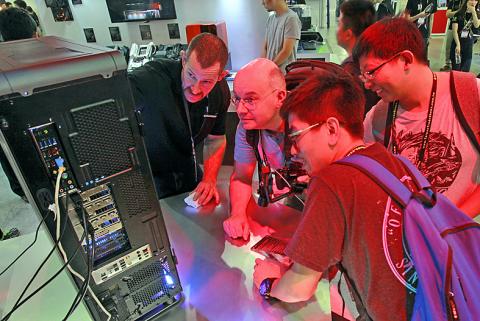Taipei Computer Association chairman Tung Tzu-hsien (童子賢) yesterday called for a better investment environment and a more open-minded attitude in response to the government’s plan to build an “Asian Silicon Valley” for start-ups and firms producing innovative products.
“It might not work if the government simply wants to copy the success of Silicon Valley,” Tung told a forum focusing on start-ups at Computex Taipei.
Tung’s remarks came after President Tsai Ing-wen (蔡英文) told the opening ceremony of Computex that the government is to carry out an “Asian Silicon Valley” initiative in Taoyuan, connecting domestic and international resources in manufacturing and research and development in a bid to develop Internet of Things (IOT) supply chains.

Photo: Chiang Ying-ying, AP
Silicon Valley represents not only a location, but an adventurous spirit of innovation and creation, despite the failures of numerous start-ups over the decades, Tung said at the forum.
He said the government is thinking from a perspective of manufacturing hardware, but it is also important to think about deregulating to improve the investment environment, such as easing the regulations that allow foreigners to take white-collar jobs in Taiwan.
It is equally important that society has an open-minded attitude to encouraging start-ups, regardless of nationality or gender, he said.

Photo: Chiang Ying-ying, AP
“Many of the important international enterprises in Silicon Valley were not founded by Americans,” Tung said.
He said that Taiwan has adequate funds and talent for new start-ups, but he is not certain if society is tolerant enough to support foreign start-ups.
If the government’s start-ups initiative is only for Taiwanese firms, then such a mind-set would not help Taiwan to achieve its goal of becoming an Asian innovation hub, he said.
Tung said he has also noticed that society has overly emphasized the difficulties that start-ups might face in the early stages of their development.
“Our education system needs to change. We should encourage the younger generation to think outside of the box, be adventurous and not afraid of failure,” Tung said.
Crowdfunding company Backer-Founder (貝殼放大) chief executive Tahan Lin (林大涵) said he thinks it is not necessary to build an “Asian Silicon Valley” in Taiwan, as it is more important to help investors cooperate with start-ups.
What start-up companies need is investors who understand their vision and their added-value, rather than having a location like an industrial park in northern Taiwan, Lin said.
InnoVEX, an exhibition featuring 217 start-ups from 22 nations, is taking place at Taipei World Trade Center Exhibition Hall 3, along with Computex Taipei.
Organizers the Taiwan External Trade Development Council (TAITRA) and the Taipei Computer Association said five main fields — hardware and the Internet of Things; B2B software; cloud applications; consumer technology; and health technology — are being displayed by both local and foreign start-ups at the venue from yesterday until tomorrow.

Vincent Wei led fellow Singaporean farmers around an empty Malaysian plot, laying out plans for a greenhouse and rows of leafy vegetables. What he pitched was not just space for crops, but a lifeline for growers struggling to make ends meet in a city-state with high prices and little vacant land. The future agriculture hub is part of a joint special economic zone launched last year by the two neighbors, expected to cost US$123 million and produce 10,000 tonnes of fresh produce annually. It is attracting Singaporean farmers with promises of cheaper land, labor and energy just over the border.

KEEPING UP: The acquisition of a cleanroom in Taiwan would enable Micron to increase production in a market where demand continues to outpace supply, a Micron official said Micron Technology Inc has signed a letter of intent to buy a fabrication site in Taiwan from Powerchip Semiconductor Manufacturing Corp (力積電) for US$1.8 billion to expand its production of memory chips. Micron would take control of the P5 site in Miaoli County’s Tongluo Township (銅鑼) and plans to ramp up DRAM production in phases after the transaction closes in the second quarter, the company said in a statement on Saturday. The acquisition includes an existing 12 inch fab cleanroom of 27,871m2 and would further position Micron to address growing global demand for memory solutions, the company said. Micron expects the transaction to

US actor Matthew McConaughey has filed recordings of his image and voice with US patent authorities to protect them from unauthorized usage by artificial intelligence (AI) platforms, a representative said earlier this week. Several video clips and audio recordings were registered by the commercial arm of the Just Keep Livin’ Foundation, a non-profit created by the Oscar-winning actor and his wife, Camila, according to the US Patent and Trademark Office database. Many artists are increasingly concerned about the uncontrolled use of their image via generative AI since the rollout of ChatGPT and other AI-powered tools. Several US states have adopted

A proposed billionaires’ tax in California has ignited a political uproar in Silicon Valley, with tech titans threatening to leave the state while California Governor Gavin Newsom of the Democratic Party maneuvers to defeat a levy that he fears would lead to an exodus of wealth. A technology mecca, California has more billionaires than any other US state — a few hundred, by some estimates. About half its personal income tax revenue, a financial backbone in the nearly US$350 billion budget, comes from the top 1 percent of earners. A large healthcare union is attempting to place a proposal before